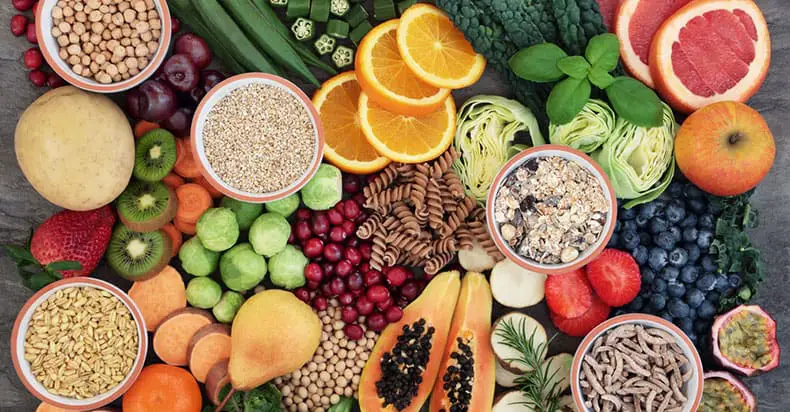Today we’ll be looking at whether vegans tend to fart more compared to folks on a standard diet. It’s a great question because there are reasons that switching to a 100% plant-based diet can both increase and reduce flatulence depending on individual food intolerances.
In short, do vegans pass gas more than non-vegans? Vegans do tend to fart more compared to non-vegans. This is true especially in the beginning and problems with gas and bloating usually subside over time. Food intolerances indeed come in many forms and animal products are not completely exempt. But, on balance, vegans fart more.
Virginia Messina aka the Vegan RD sums it up best in her outstanding book Vegan for Life:
“New vegans who aren’t used to eating legumes and high-fiber foods may experience another type of intolerance that results from increased gas production and intestinal discomfort. It’s hard to convince people that gas is good for them, but it may very well be true!”1
Keep in mind this applies to individuals who consume more whole plant foods after switching to a vegan diet. This isn’t always the case, and some vegans let low-fiber highly-processed foods fill the animal product void after making the switch.
As with all things, results vary per individual and some folks find that indigestion and gas actually decrease when switching to a diet free of animal products. For example, a person might have a particularly bad intolerance to lactose (milk sugar) while handling other carbs well.
By eliminating milk and dairy products altogether, said person might find themselves farting less after making the switch.
So, in this article, we’ll be looking at the various causes of farting on a vegan diet and the steps you can take to mitígate gassy symptoms while becoming acclimated to the new way of eating.
Here we’ll be looking at the most common culprit of vegan farting: food intolerances. If you think your problem runs deeper, make sure to check out the other article on gas and bloating related to the vegan diet. It’s a deep dive into some of the more serious digestive issues commonly exacerbated by elements of 100% plant-based diets. It covers IBS, IBD, SIBO, etc.
Do Vegans Fart More? And If So, Why So Much?
Carbohydrate Intolerance: The Main Cause of Vegan Farting
Sure, there can be serious underlying digestive issues that lead to excess farting on a vegan diet. But, most problems come from plain old carb intolerance. So you know, the term carbohydrate refers to a large group of organic compounds.
While most people are aware of lactose (glucose plus galactose), which obviously isn’t a problem for vegans, there are plenty of other carbohydrates that cause problems.
Lactose is only one of many carbs belonging to a category known as FODMAPS. The acronym stands for “fermentable oligo-, di-, mono-saccharides and polyols.”2
Mono- and disaccharides are referred to as sugars while polysaccharides (longer carb chains) are referred to as starch or fiber depending on the bonds present. Oligosaccharides are somewhere in the middle in terms of chain length. They’re several units long and much shorter than long complex carb chains.
The FODMAP category is comprised of short and medium-chain carbs, but starches and fibers also pose problems—especially fiber.
The issue has to do with absorption. Anything not properly broken down and absorbed by the small intestine makes its way to the colon where bacteria feed on the leftovers creating gas.
In some cases, our SI completely lacks the necessary enzymes to break down the carb (specifically fiber and most FODMAPs), in other cases, the SI doesn’t contain the needed enzyme in sufficient quantities (lactose).
When the undigested carbs along with water (carbs love water) reach the colon, it can increase the osmotic load in the GI tract, hence the bloating.3
Gut bacteria proceeds to ferment the carbs (they have the needed enzymes), which creates a ton of gas in the process (hydrogen, CO2, and methane).4
So, a lack of needed enzymes can be the culprit.
Sometimes the issue is a lack of mechanical digestion (mastication). When consuming a diet high in unprocessed plant matter, it’s not uncommon for intact grains to make their way to the colon where bacteria can feed on the starches that would have otherwise been absorbed in the SI.
Another issue is malabsorption. For example, if someone has suffered damage to the structure (and thus function) of the GIT—inflammation, surgery, etc.—then carbs which are otherwise non-problematic can cause gas as they make their way to the large intestine coming into contact with gut bacteria.
Again, we won’t be going deep into that subject here.
Other Food Intolerances (Allergies, Etc.)
Carbohydrate intolerance is obviously just one category of adverse reactions to food.
ARFs encompass allergies and food intolerances.
The term food allergy refers to reactions that have an immunological basis that occur as a result of consuming certain proteins.
A food intolerance is an ARF lacking IgE-mediated immune system involvement. Rather, the reactions result from enzyme deficiencies (as discussed above) and certain chemicals. An exception to this would be gluten intolerance which does involve the immune system.
Both cause gas and bloating and food intolerances are definitely the most common.5
Here we’ll focus on other food intolerances because ARFs only account for true IgE-mediated food hypersensitivity—i.e. if you have a true food allergy, then you likely know about it because they are serious and can be life-threatening.
Histamine Intolerances: A Common Cause of Vegan Farting
Histamine is a chemical released by cells in response to injury, allergic, and inflammatory reactions and it is a common cause of excess farting on the vegan diet.
Histamine intolerance takes place when there’s a buildup of histamine in the body. Everyone has a certain level of histamine they can tolerate without manifesting symptoms. However, when levels surpass this threshold, symptoms like GI discomfort and flatulence can occur.
Anyway, the histamine content in common foods (many being plant-based) has long been implicated as a primary cause of food intolerances that lead to gas and bloating.6
This is another area where animal products are implicated. For example, tuna and cheese pack a fair amount I.e. histamine intolerance isn’t unique to plant-based diets.
However, there is a fairly wide range of plant foods that contain histamine in large amounts.
These include:7
- Fruits like bananas, strawberries, citrus, pineapple, and tomatoes
- Peanuts
- Certain greens like spinach
- Green tea
- Certain legumes like lentils, chickpeas, and soybeans.
- Sauerkraut
- Vinegar
- Cocoa powder and chocolates
- Alcohol—some drinks can contain as much as 500 mg/kg of histamine
Do Vegan Farts Smell Worse Than Meat Eaters?
You might be wondering why some of your farts smell so bad, if vegan farts smell worse than meat eater farts, and whether or not dietary composition might have an effect on this phenomenon. It’s a great question because the only thing more embarrassing than a noisy fart is a smelly one.
Theoretically, a vegan diet could result in smellier farts via the high-sulfur content of certain plants. But, not all vegans consume high-sulfur foods. Plus, the high-fiber content of plant-based diets speeds up transit, limiting the opportunity for microorganisms to produce foul-smelling odors.16
While there are no randomized, placebo-controlled, double-blind studies on the smelliness of vegan farts compared to farts of non-vegans, specific foods do affect gas composition, and certain gases are more offending than others.
Human intestinal gas has a daily volume of about 200 ml. The gas results from complex physiologic processes, including bacterial fermentation and swallowed air in the GIT. Accumulated gas is either passed rectally (flatus) or expelled via belching (eructation).
The main forms of gas include:13
- Carbon dioxide (CO2)
- Nitrogen (N2)
- Oxygen (O2)
- Hydrogen (H2)
- Sometimes methane (CH4)
Some folks wonder if methane plays a role. Methane in gas occurs in around one-third of healthy individuals.14 It results from a complex process involving the metabolism of other gases, specifically H2, and from certain bacteria in the colon.
Methane itself is a colorless gas, so it’s not implicated in smelly farts. Unfortunately, abnormal CH4 production has been linked to the pathogenesis of several intestinal problems like colon cancer, irritable bowel syndrome (IBS), irritable bowel disease (IBD), and diverticulosis.15
The main culprit of bad smelling gas is sulfur in various forms which can explain why someone on a 100% plant-based diet may notice more pungent-smelling gas. Sulfur is present in a wide variety of plant foods.
While methane is odorless, methanethiol (methane plus sulfur) has a strong rotten egg character. Hydrogen sulfide also produces a rotten egg smell.
So, if you find that your farts stink and are smelling worse, keep in mind that your GIT should adapt to the new way of eating over time causing the problem to subside. If it doesn’t improve, you may want to play around with your consumption of foods high in sulfur. Such foods are healthy (anti-cancer, etc.), so including them in the diet to some degree if possible would be ideal.
How To Stop Farting On A Vegan Diet

If you suffer from excess gas on the vegan diet, there are some measures you can take to minimize flatulence and if you implement them, it should bring you back to normal—assuming there are no bigger underlying digestive issues at work.
Limit High Fiber Foods in the Beginning
Fiber offers a number of health benefits, so it’s definitely something you’ll want to include in copious amounts. But, if gas is an issue, it can be helpful to limit high-fiber foods in the beginning, slowing increasing the serving size over time.
Starting small can allow healthy bacteria to proliferate in the gut, which should result in less gas production over time.
I found this to be the case when I transitioned to a vegan diet. I made the switch rather abruptly and experienced uncomfortable GI symptoms at first.
I started with a low dose of legumes, and upped the serving size systematically, starting with a 1/8 of a cup, then 1/4, 1/2, etc. I’m now comfortably consuming 2 cups of beans in one sitting.
For Beans, Start with Lentils
Lentils have a reputation for inducing much less gas compared to other beans like pintos. So, you might want to begin your high-fiber plant-based journey with lentils and graduate to other options over time.
Soak Your Legumes
There’s a lot of fermentable sugars on the surface of beans that can easily be removed by soaking and rinsing. This is an easy fix that can go a long way in reducing bean-induced farting.
Consider Using Beano
Yes, another bean suggestion.
Above it was mentioned that a lack of enzymes can be the culprit. Our SI completely lacks enzymes needed to digest the fibers present in legumes… at least until we introduce the enzymes from the outside.
That’s right, Beano is an exogenous enzyme. It’s an awesome, underappreciated hack. Non-vegans do it all the time with Lactaid, which is the equivalent product for dealing with lactose intolerance.
So, if beans are the issue, you can take the needed enzymes in pill form which will help you break down (and thus absorb) the sugars before they reach the colon.
Ultimately, it would be ideal if you could phase the enzymes out because they do reduce the amount of fiber that makes it to the large intestine. Fiber that would otherwise be used to feed beneficial gut flora. But, in the beginning, Beano is great for use as a crutch to get you through the transition to a 100% plant-based diet.
Tips for Other Intolerances
Identifying specific food intolerances can be tricky. Sometimes it’s not obvious which foods are causing problems.
When registered dietitians help patients address these issues, they usually rely on elimination diets and food/symptom records.
Medical Nutrition Therapy (MNT) usually involves a thorough history, a physical assessment, an evaluation of lifestyle factors, medications, and medical conditions, etc.
A food record recording 7-14 days of food consumption along with a symptom journal help patients pinpoint which foods are causing which problems.
With food elimination diets, suspect foods are eliminated from the diet for 4 to 12 weeks, at which point they’ll be reintroduced in a controlled manner while monitoring for symptoms. If symptoms recur, it helps pinpoint which food is at fault.
If you suspect that histamine may be the problem, you may start by eliminating some of the foods in the above list, and reintroducing them to see if any cause issues.
Other Tips
These are not specific to the vegan diet but are known for helping reduce gas in general.
Watch Out For “Aerophagia”
Yes, that’s a word. It’s not a food intolerance, but rather an issue people encounter when they swallow too much air which can lead to excess farting and belching. It can be caused by consuming food/drink too quickly, using straws when drinking, chewing gum, carbonated beverages, smoking, and loose dentures.8
Limit Caffeine and Other Stimulants
Caffeine is a wonderful psychoactive compound that increases productivity, alertness, etc. But, it can cause unpleasant GI symptoms when consumed in excess. At least, for some. Being a stimulant, it interacts with receptors in the colon.
It’s most abundant in tea, coffee, tea, soft drinks, and sports drinks. It’s also added to some medicines, energy supplements, and weight-loss products. A lot of folks tolerate the compound well, so it varies from person to person.9
Caffeine isn’t the only stimulant that can cause issues. For example, coffee intake increases colonic motility in 29% of people, caffeine or no caffeine.10,11
Even for long time caffeine consumers who tolerate it well, it may still be useful limiting intake to see if it has an effect. After all, we could all do without the added food intolerance when first switching to a vegan diet.
Limit Artificial Sweeteners Products
Artificial sweeteners and sugar-free food products containing sugar substitutes (think gum, mints, candies) can be problematic if they contain sugar alcohols like Sorbitol, Mannitol, and Xylitol.
The former (Sorbitol) is a sugar alcohol that’s especially difficult to absorb that’s naturally found in certain fruit. While it’s found in small amounts in real fruit, it is added in much larger amounts to reduced-sugar/sugar-free foods.12
Do Vegan Farts Stink More? Conclusion
That’s it for now. Just remember that if you’re new to a 100% plant-based diet, a bit of gas and bloating should be expected. And, as mentioned by the Vegan RD, it’s nothing to be alarmed about, and can actually be indicative of healthy processes.
Gut bacteria can feast on any number of substrates depending on the specific species. And the high amounts of fiber present in a whole food plant-based diet has been shown to feed healthy bacteria which contributes to a beneficial gut microbiome.
That pretty much wraps it up for the subject of vegan farting. Thanks for reading.
References
- Virginia Messina and Jack Norris. Vegan for Life: Everything You Need To Know To Be Healthy (Page 94). ISBN: 978-0-7382-1493-1
- Peter R Gibson, Susan J Shepherd. Evidence‐based dietary management of functional gastrointestinal symptoms: The FODMAP approach. https://onlinelibrary.wiley.com/doi/full/10.1111/j.1440-1746.2009.06149.x
- Macfarlane GT, Cummings JH. The control and consequences of bacterial fermentation in the human colon. J Appl Bacteriol 1991; 70: 443–59.
- Nayoung K, AY Seo, and Dong HO. Abdominal Bloating: Pathophysiology and Treatment. J Neurogastroenterol Motil. 2013;19(4): 433–453. https://www.ncbi.nlm.nih.gov/pmc/articles/PMC3816178/
- Beyer K, Cochrane S, Wjst M, Clausen M, Hiller R, Szepfalusi Z, et al. Factors influencing the incidence and prevalence of food allergy. Allergy 2009;64(9): 1246–1255.
- Wöhrl S, et al. Histamine intolerance-like symptoms in healthy volunteers after oral provocation with liquid histamine. Allergy Asthma Proc. 2004 Sep-Oct;25(5):305-11. https://pubmed.ncbi.nlm.nih.gov/15603203/
- Jee Hee Son, Bo Young Chung, et al. A Histamine-Free Diet Is Helpful for Treatment of Adult Patients with Chronic Spontaneous Urticaria. Ann Dermatol. 2018 Apr; 30(2): 164–172. https://www.ncbi.nlm.nih.gov/pmc/articles/PMC5839887/#S1
- Krause’s Food & the Nutrition Care Process (Page 526) L. Mahan-Janice Raymond – Elsevier – 2017
- Samsom M, Boekema PJ, Smout AJ, van Berge Henegouwen GP. Coffee and gastrointestinal function: facts and fiction. A review. Scand J Gastroenterol Suppl 1999; 230: 35–9. https://pubmed.ncbi.nlm.nih.gov/10499460/
- Cann PA, Brown SR, Read NW. Effect of coffee on distal colon function. Gut 1990; 31: 450–3. https://pubmed.ncbi.nlm.nih.gov/2338272/
- Welcher K, Rao SS, Zimmerman B, and Stumbo P. Is coffee a colonic stimulant? Eur J Gastroenterol Hepatol 1998; 10: 113–18. https://pubmed.ncbi.nlm.nih.gov/9581985/
- Rumessen JJ. Fructose and related food carbohydrates: sources, intake, absorption, and clinical implications. Scand J Gastroenterol 1992; 27: 819–28. https://pubmed.ncbi.nlm.nih.gov/1439534/
- Krause’s Food & the Nutrition Care Process (Page 525) L. Mahan-Janice Raymond – Elsevier – 2017
- Ara B. Sahakian, Sam-Ryong Jee, and Mark Pimentel. Methane and the Gastrointestinal Tract. Dig Dis Sci. DOI 10.1007/s10620-009-1012-0. http://image.sciencenet.cn/olddata/kexue.com.cn/upload/blog/file/2010/1/2010123203248875447.pdf
- Triantafyllou K et al: Methanogens, methane and gastrointestinal motility, J Neurogastroenterol Motil 20:31, 2014.
- Unity Point, The Truth About Gas. https://www.unitypoint.org/livewell/article.aspx?id=f4ac971f-95a4-49ad-b08d-2be2467257e0

